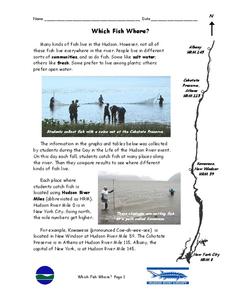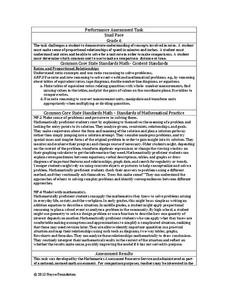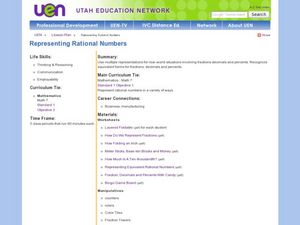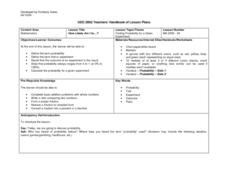Curated OER
Camouflage
Here is a lesson which incorporates ingenious hands-on activities that simulate how many animals use camouflage as a survival technique. This lesson clearly outlines how to implement the activities and discussion sessions found in it....
Curated OER
Which Fish Where?
Focusing on the fish in the Hudson River Estuary, this activity could be used to practice reading, graphing ,and critical-thinking skills. Answering the 6 questions should be interesting for students due to the interesting subject matter.
Curated OER
Math: Greater Than, Less Than, Equals
Elementary schoolers learn about using the symbols for greater than, less than and equal to. They answer nine questions using the information they learned. The answers are on the last page of the packet.
Noyce Foundation
Snail Pace
Slow and steady wins the race? In the assessment task, scholars calculate the rates at which different snails travel in order to find the fastest snail. Hopefully, your class will move much more quickly in finishing the task!
Pennsylvania Department of Education
Comparing Sets
Students count back with cubes to model subtraction problems. In this subtraction lesson plan, students compare sets of problems and record their results in a table.
Curated OER
Going Whole Hog
Students participate in a game in which they compare fractions and graph the fractions.
Curated OER
Compare and Arrange Whole Numbers Up to 100
Number whizzes investigate integers by arranging them in a specific order. They utilize whole numbers which are given to them and then put them in order up to 100. They also practice using "greater than" or "lesser than" symbols.
Curated OER
Representing Rational Numbers
Seventh graders explore rational numbers. In this fractions, decimals, and percents lesson, 7th graders identify and compare equivalencies between fractions, decimals, and percents. Students use hands-on activities to investigate the...
Curated OER
Introduction to Decimals
In this math worksheet, students are introduced to decimals by first studying pattern blocks showing a number with tens, ones and tenths. Students locate decimals on number lines and rulers and shade decimal pictures. Students compare...
Curated OER
Probability: How Likely Am I to...?
Twelfth graders examine various ways probability is applied to daily situations. They use marbles and blocks to calculate the probabilities of picking certain colors. They also calculate the odds of picking a winning raffle ticket.
Curated OER
Compare and Order Fractions and Decimals
In this fraction and decimal worksheet, 4th graders order each group of numbers in 6 word problems. They order mixed groups of decimals and fractions greatest to least, or least to greatest as indicated.
Curated OER
Beginning Short Stories - "A Call to the Pool"
In these short stories worksheet, students read the basic and advanced version of the story "A Call to the Pool." Students then answer 3 comprehension and vocabulary questions.
Curated OER
Numerical Analysis: Worksheet 12: Comparing Root-Finding Methods
In this root-finding activity, students rank numbers in asymptotic order. They identify and discuss the roots of the original function. This four-page activity contains approximately 10 problems.
Curated OER
Approximate Solution to an Equation
Students solve equations through trial and error. In this algebra activity, students first estimate their answers and then calculate it to check their work. They solve problems involving roots and integers.
Curated OER
What Are We Listening To?
Students gather data from a web site on number of music albums sold by genre for the last two years. They convert these figures to fractions, decimals, and percents, and display the results in bar graphs and pie charts.
Curated OER
To Be Or Not To Be... (Hamlet)
Students complete a unit of lessons on William Shakespeare's Hamlet. They analyze the plot, themes, and characterization, relate songs to thematic issues, develop plot summaries and translations, and compare the play to a movie version.
Curated OER
The Economic Differences Between the North and the South Prior to the Civil War
Seventh graders identify and explain the economic differences between the North and the South incorporating photographs and a Venn Diagram to interpret the two sides. They complete a KWL and T-chart to assist them with their task for the...
Curated OER
Count Down the Days to a Special Event
Students calculate time using a grade appropriate skill. In this time instructional activity, students calculate the time to a special event. Students calculate days, months, weeks, hours, minutes or seconds depending on their skill...
Curated OER
Subtracting Whole Numbers and Decimals
In this math worksheet, students learn to subtract whole numbers and decimals. Students are given step by step directions on how to solve one sample problem, then complete 5 examples on their own. Example: 6.57 - 3.28. There is...
Curated OER
Comparing and Ordering
For this math worksheet, students examine a number line from 720 to 870. Students mark ten numbers, placing them on the number line and then write them in order. Students then use the < or > sign to compare 20 pairs of numbers up...
Curated OER
Round to the Nearest Whole $
In this rounding money activity, students identify the money amounts in each examples and round to the nearest dollar for the 10 examples.
Curated OER
8th Grade Reading Comprehension Success
Augment your eighth grade language arts curriculum with a thorough set of reading comprehension activities and assessments. Focusing on a variety of skills, including vocabulary in context, text structure, main idea, and author's style,...
Curated OER
Challenge: Zero Patterns
In this multiplication worksheet, students use mental math to solve 12 multiplication problems. Students find the product of 1 or 2 digit numbers multiplied by 2 or 3 digit numbers. Students use the multiplication pattern of counting...
Curated OER
Handling Data: measure of Average
Fifth graders analyze data from a simple table. In this graphing lesson, 5th graders compare distributions. Students recognize that the mean helps them find the formula. Students answer questions on the mean, median, and range.

























